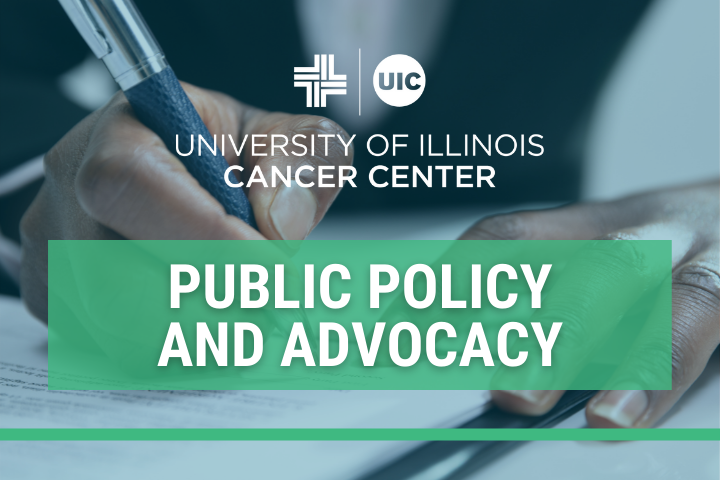
A panel of health care experts that included Yamile Molina, PhD, the University of Illinois Cancer Center’s Associate Director of Community Engagement and Associate Professor, University of Illinois Chicago’s School of Public Health, discussed policy solutions to address health equity and eliminate cancer disparities at the American Cancer Society’s Cancer Action Network policy forum.
Hosts of the forum noted the Illinois General Assembly achieved se veral cancer-relevant health equity successes in its 102nd session, including passage of a measure to ensure follow-up colonoscopies are covered as part of the preventative screening process and ensuring access to biomarker screening for publically insured cancer patients. Yet the passage of legislation does not necessarily translate to health equity for all patients, panelists said.
The Illinois Breast and Cervical Cancer Program has screened 41,378 women over the last five years, and 18,274 women have received pap tests and 34,711 women received mammography services. Molina, however, pointed out that the Breast Cancer Excellence in Screening and Treatment (BEST) Act of 2015 hasn’t been fully implemented in the six years since its passage.
The law, spearheaded by Equal Hope (a health disparities not-for-profit organization in Chicago), in collaboration with UIC leaders such as Carol Ferrans, PhD, RN, FAAN, a founder of Equal Hope, built upon prior legislation known as the Breast Cancer Disparities Reduction Act in 2009. The original legislation sought to create equity for poor and publically insured women, whose breast cancers were far more likely to be missed on screening mammograms because of poorer quality mammography.
The BEST Act sought to address breast cancer treatment quality and to implement navigation for cancer patients along with assuring access to Academic Commission on Cancer Accredited Cancer Program and Breast Imaging Centers of Excellence for Medicaid patients.
“There are major parts of the law that have yet to be implanted. So what happened?” Molina asked participants. “There are structural barriers and no penalty for failure to implement. The systems, these structures, exist to disenfranchise.”
Due to health disparities linked to economic, social or environmental disadvantages, Black women are 40% more likely to die of breast cancer compared to white women, and twice as likely to die if under the age of 50, according to the ACS CAN. Hispanic/Latina women suffer clinically meaningful worse quality of life compared to white women, after receiving breast cancer diagnoses, according to multiple systematic reviews and meta-analyses.
At least one new law may positively impact disparities in outcomes for cancer patients. Advocates including ACS CAN and the University of Illinois Cancer Center applauded the passage of IL HB 1779, which granted nearly 3.5 million people in Illinois access to comprehensive biomarker testing. Biomarker testing allows physicians to target cancer with the most effective therapy, known as precision oncology. The biomarker bill, which was unanimously passed, ensures that Medicaid and the state will cover testing when indicated. Illinois became the first state in the U.S. to pass biomarker testing coverage.
This year the Black Caucus presented and passed the Health Equity Pillar, a law aimed to address health inequities with new programs, training opportunities, and improving transparency. The law, signed in April 2021, is part of the group’s “four pillars” approach to societal improvements, including health care, criminal justice reform, education and workforce development, and economic access.
ACS CAN supported several provisions of the legislation, including implicit bias and racial training, expanded sick leave, increased access to primary care physicians and Federally Qualified Health Centers (FQHCs), and additions to state health assessment and improvement plans, said Shana Crews, Illinois Government Relations Director for ACS CAN.
Additional successes included expanding the Medicaid coverage of tobacco cessation counseling, and maintaining the funding for the Illinois Tobacco Quitline, two measures aimed at assisting the 14.5% of Illinois adults who smoke. And more than 290,000 people in Illinois will be able to purchase an insurance plan with predictable and fixed prescription drug costs beginning in 2023. Illinois is the first state to pass this legislation.
Molina was joined on the panel by Jordan Powell, Illinois Hospital Association; Dr. Melissa Simon, Northwestern University and Equal Hope board member; and Dr. Blase Polite, University of Chicago.
